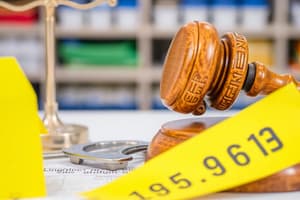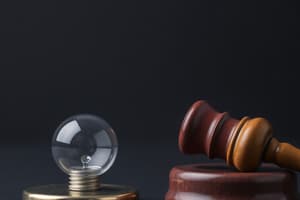Podcast
Questions and Answers
What is the main focus of product liability in legal terms?
What is the main focus of product liability in legal terms?
- Establishing negligence in product manufacturing
- Holding individuals accountable for harm caused by defective products (correct)
- Enforcing strict liability laws for all legal cases
- Compensating individuals for harm caused by any product
How does strict liability differ from negligence in product liability cases?
How does strict liability differ from negligence in product liability cases?
- Negligence shifts the burden of proof to the plaintiffs.
- Negligence allows for holding companies liable without proof of defects.
- Strict liability holds manufacturers accountable even without proving negligence. (correct)
- Strict liability requires proving negligence on the part of the manufacturer.
Why are product liability cases considered costly for businesses?
Why are product liability cases considered costly for businesses?
- They have no impact on business finances.
- They lead to decreased insurance premiums.
- They involve proving negligence beyond doubt.
- They often require compensation regardless of fault. (correct)
What impact does legislation have on reducing liability claims in product liability cases?
What impact does legislation have on reducing liability claims in product liability cases?
In a negligence lawsuit, what type of damages are typically sought?
In a negligence lawsuit, what type of damages are typically sought?
Can a manufacturer be held liable under product liability laws without being found negligent?
Can a manufacturer be held liable under product liability laws without being found negligent?
What is the central idea behind negligence in personal injury cases?
What is the central idea behind negligence in personal injury cases?
Which of the following best describes the relationship between product liability and negligence?
Which of the following best describes the relationship between product liability and negligence?
If a defect in a product leads to an injury, what legal concept can be invoked against the manufacturer?
If a defect in a product leads to an injury, what legal concept can be invoked against the manufacturer?
What does legal liability refer to in the context of supervisors?
What does legal liability refer to in the context of supervisors?
How do compensatory damages in negligence cases differ from punitive damages?
How do compensatory damages in negligence cases differ from punitive damages?
How does strict liability relate to supervisors according to the text?
How does strict liability relate to supervisors according to the text?
What is the relationship between supervisor liability and employer liability?
What is the relationship between supervisor liability and employer liability?
In the context of legal responsibility, why might a supervisor face legal liability?
In the context of legal responsibility, why might a supervisor face legal liability?
What is one of the elements required for supervisors to be held legally liable?
What is one of the elements required for supervisors to be held legally liable?
In legal terms, what must be foreseeable for a supervisor to be held liable?
In legal terms, what must be foreseeable for a supervisor to be held liable?
What can supervisors do to mitigate their liability according to the text?
What can supervisors do to mitigate their liability according to the text?
What type of liability involves intentional harm by a supervisor?
What type of liability involves intentional harm by a supervisor?
Which of the following is NOT a step that supervisors can take to mitigate liability?
Which of the following is NOT a step that supervisors can take to mitigate liability?
What must supervisors do to fulfill their responsibility of ensuring a safe workplace according to the text?
What must supervisors do to fulfill their responsibility of ensuring a safe workplace according to the text?
Flashcards are hidden until you start studying
Study Notes
Unraveling Legal Liability: A Focus on Product Liability and Negligence
Legal liability is a broad concept that encompasses the obligation to compensate for harm caused due to one's actions, inactions, or the actions of individuals or property for which they are responsible. In this article, we'll dive into two distinct types of liability: product liability and negligence, which are integral parts of the legal landscape you're about to explore.
Product Liability
Product liability is a branch of tort law that holds manufacturers, distributors, and retailers accountable for any harm caused by a defective product. The concept of strict liability, which was introduced to ease the burden of proof for plaintiffs, makes it possible to hold manufacturers liable even if no negligence is involved. In fact, around 46 U.S. states have laws that establish strict liability, meaning a company can be held liable for defective products without having to prove they were negligent.
Product liability cases can be costly for businesses and may lead to higher insurance premiums, making it a critical concern for companies in numerous industries. Despite efforts to reduce liability claims through legislation, unconstitutional limitations and even the evolution of legal standards in some U.S. courts may actually increase liability in certain cases.
Negligence
Negligence, on the other hand, refers to a failure to exercise the level of care that a reasonably prudent person would have exercised under similar circumstances. This concept is central to many personal injury cases and often involves accidents, such as car crashes or slip-and-fall incidents.
Negligence lawsuits are based on the idea that when someone causes harm to another due to negligence, they should be held responsible for the financial losses that result. Damages in negligence cases are typically compensatory, meaning they aim to put the injured party in the position they would have been had the injury not occurred.
The Intersection of Product Liability and Negligence
Both product liability and negligence are interconnected concepts that can be invoked to hold parties accountable for the harm they cause. For example, a manufacturer that produces a defective product can be held liable under product liability laws if the defect leads to injury. In such cases, the manufacturer does not have to be found negligent to be liable. However, if the defect is discovered due to the company's negligence, they may also be held liable for their negligent actions.
The legal landscape surrounding liability is complex, and the definitions and requirements for liability may vary by state. However, the key principles of legal liability, such as product liability and negligence, are fundamental to our understanding of the law's role in compensating for harm caused by wrongful conduct.
Studying That Suits You
Use AI to generate personalized quizzes and flashcards to suit your learning preferences.




